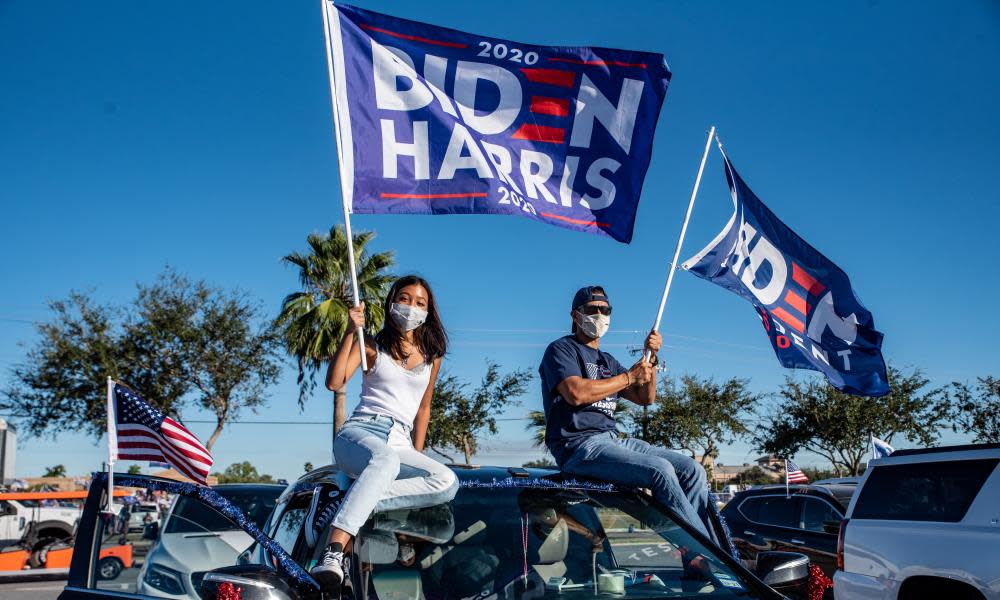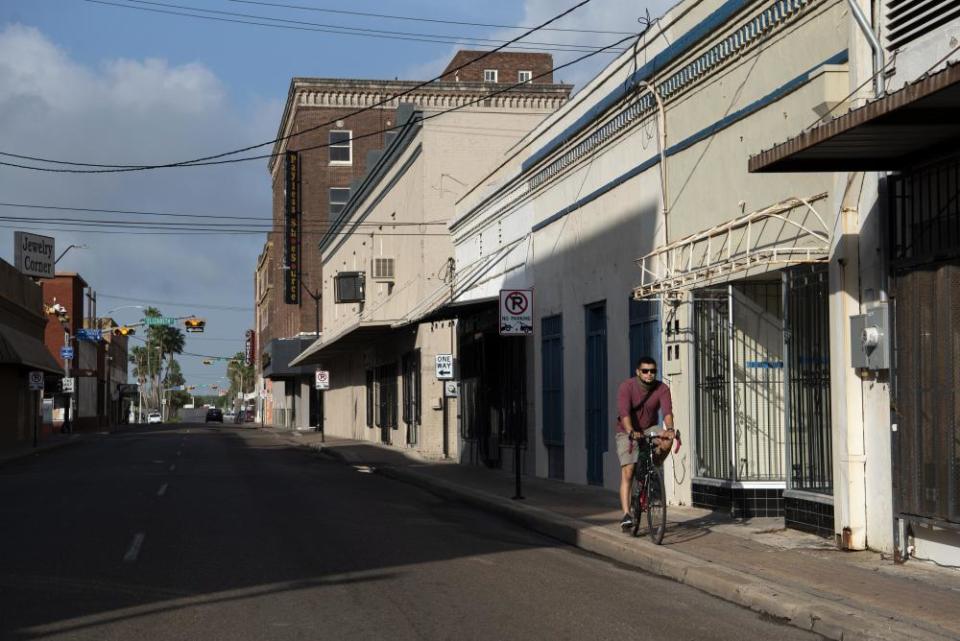Why Democrats lost Latino voters along Texas border: 'They relied on loyalty'

While Democrats aggressively pushed to turn Texas blue this election cycle, they were banking on help from people like Barbara Ocañas, a highly educated, 37-year-old Latina voter from the Rio Grande valley.
But, after Donald Trump faced backlash for using the word “coyote” to describe human smugglers, Ocañas was turned off by liberals focused more on semantics than the actual realities of the migrant crisis affecting her home. As the daughter of a Mexican émigré, she believes that undocumented immigrants are “just people, like you and me”.
However, when it comes to earning US citizenship, “there is a right way and a wrong way to do it”, she said.
She also fears what Democratic presidential nominee Joe Biden’s administration could mean for people she knows who rely on jobs in refineries or hauling crude oil. So, faced with a ballot and a choice, Ocañas decided she preferred four more years with Donald Trump in the White House.
“Not all of us take it to heart when we’re called rapists and bad hombres,” she said. “We have tough skin.”
Democrats have just assumed and relied on this historical loyalty by people in the valley to the Democratic party.
In Texas border towns with chronically low voter participation, residents did actually show up to the polls this election, exceeding county turnouts from 2016. But when results rolled in Tuesday night, Biden’s overall success was nowhere near Hillary Clinton’s slam dunk four years earlier, revealing Democratic vulnerabilities among a key bloc whose votes had largely been taken for granted.
“Democrats have just assumed and relied on this historical loyalty by people in the valley to the Democratic party,” said Natasha Altema McNeely, an associate professor of political science at the University of Texas Rio Grande Valley. “And that assumption, I think, is very dangerous for the Democrats if they expect to continue to help the valley remain blue.”
Biden still won Ocañas’s Hidalgo county, but with a fraction of the margin. In Starr county, which Clinton had dominated in a 60-point landslide, voters swung for Biden by just five points. And, after Democrats squandered a nearly 33-point advantage from four years ago, Zapata county flipped to deliver Trump a stunning victory.
That erosion of Democratic support took place even after high-profile Biden surrogates descended on the US-Mexico border ahead of election day. Jill Biden, Joe’s wife, campaigned in El Paso on the first day of early voting, when – amid buzz that Texas might be in play – she told her audience that a win in the state would mean that “we are unstoppable”.
Then, in an 11th-hour push to get out the vote, former presidential rivals Beto O’Rourke and Julián Castro joined forces with the vice-presidential nominee, Kamala Harris, in the valley last week. Harris had flown to south Texas, she said, “because there are people here who matter”.
Although residents in the valley lean left in terms of partisanship, “many people actually bleed red” ideologically, McNeely said. Some of that boils down to religious beliefs, with large contingents of Catholics and Protestant evangelicals in the area.
There’s also a pernicious machismo among some Latinos, so seeing a “strong man” may have driven enthusiasm for Trump, said Manuel Grajeda, the Texas strategist for civil rights and advocacy organization UnidosUS. To Ed Espinoza, executive director of the media non-profit Progress Texas, south Texas’s dramatic twist on election night looked “less like Latinos leaving Biden and more like rural voters flocking to Trump”.
But a potential surge in conservative values doesn’t fully explain why Democrats lost so much ground along the border. Going into the election, Texas Latinos were far less interested in social issues such as limiting abortion, and far more invested in policies around healthcare and the economy, according to the American election eve poll.
Above all else, they were concerned about the raging coronavirus pandemic, and negative reactions to hardline local Covid-19 restrictions may have at least partly contributed to Democrats’ lukewarm reception in the valley, McNeely suggested.
Although county governments there initially garnered positive national attention for their swift responses to the deadly virus, a continued push for protective measures after the state abruptly emerged from lockdown proved controversial among some residents. Commenters online criticized officials for what they saw as heavy-handed, overblown reactions to the pandemic, McNeely said, even as valley hospitals racked up a devastating body count.
Another potential factor is the sizable law enforcement presence in the valley and its surroundings, including officers with the federal government’s highly politicized border security agency. Ocañas, for example, views border patrol agents as protectors, not enemies, and she balked at the criticism they have faced on the job.
About three-quarters of valley residents oppose Trump’s pet project of a border wall, including Ocañas, who is well aware that it will do “absolutely nothing” to stop migrant crossings. But it does create jobs, she said, and as the Trump administration funds border enforcement, “I see more action.”

The prospect of a tax hike also soured Ocañas on the Biden-Harris ticket, a recurring theme among voters, Grajeda said, despite Biden assuring Americans that anyone who made less than $400,000 a year would not experience a tax increase under his leadership. Where Ocañas lives, the median household income was below $40,000 in recent years.
At the end of the day, Ocañas said, liberal Democrats just fundamentally misunderstand Latino voters – and talk down to them, “almost like we’re stupid, almost like we’re children”. Although she’s tried to have conversations with people “on the other side” of the political debate, she has been called straight-out crazy and a race traitor to her face.
Victoria M DeFrancesco Soto, an assistant dean at the University of Texas’s LBJ school of public affairs, hypothesized on election night that the lack of old-fashioned, grassroots organizing because of Covid-19 might have played a part in Biden’s underperformance in the Valley.
But the pandemic didn’t stop caravans of Trump supporters from boisterously rallying around south Texas for months leading up to election day, a harbinger of what was to come.
“I think people who were excited to vote for Trump are just a lot more excited to do that than a lot of people who would turn out for Biden,” Grajeda said. “And I think the people who are most excited to turn out for Biden are middle-upper-class, white people.”

